FIDE 100 Torch Relay reaches United Arab Emirates
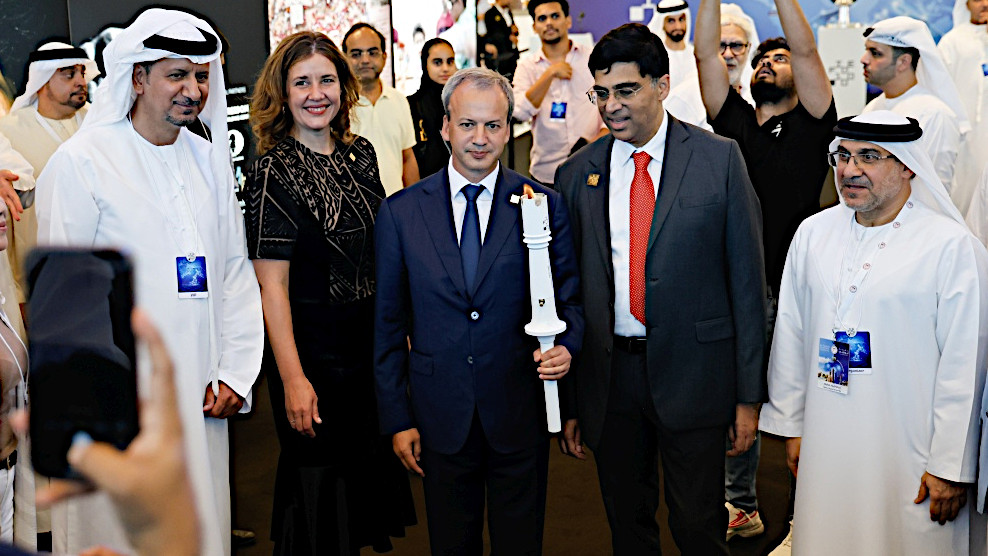
The celebration of FIDE’s 100-year anniversary continues as the FIDE 100 Torch Relay arrives in the United Arab Emirates. This is the last stop of the torch before it reaches its final destination in the Hungarian capital, Budapest, coinciding with the launch of the 2024 Chess Olympiad scheduled from September 10 to 23. The event was held at Marina Mall in Abu Dhabiunder the patronage of the Abu Dhabi Sports Council and organized by the Abu Dhabi Chess and Mind Games Club. The event was attended by His Excellency Sheikh Nahyan bin Mubarak Al Nahyan, Minister of Tolerance and Coexistence, FIDE President Arkady Dvorkovich, His Excellency Sheikh Saud bin Abdulaziz Al Mualla, Vice President of the International Federation, Hussein Abdullah Al Khouri, Chairman of the Board of Directors of the Abu Dhabi Chess and Mind Games Club, Mohammed Al Mudahka, President of the Qatar Chess Federation, Viswanathan Anand, five-time World Champion and Deputy President of the International Chess Federation, alongside officials from the Abu Dhabi Sports Council. His Excellency Sheikh Nahyan bin Mubarak Al Nahyan received the commemorative gold medal from Arkady Dvorkovich on the occasion of the centenary celebration. He also participated in the launch of the exhibition matches on the sidelines of the ceremony. Mohammed Al Mudhahka and the African and Arab champion, Grandmaster Ahmed Adly, played against 15 players simultaneously. During the ceremony, Arkady Dvorkovich noted that the game of chess is rapidly developing in the UAE, thanks to the support it receives and the increasing interest it holds. He additionally expressed his happiness with the great passion of the participants in the 30th edition of the Abu Dhabi International Chess Festival. Hussein Abdullah Al Khouri stated that the torch relay event in Abu Dhabi, held to mark the centenary of the International Federation, achieved great momentum. The event was attended by His Excellency Sheikh Nahyan bin Mubarak Al Nahyan and senior officials, further solidifying the UAE and the Emirate of Abu Dhabi’s strong position in organizing and hosting international sporting events. The torch relay in Abu Dhabi was in sync with the ongoing 30th Abu Dhabi International Chess Festival. Known as the region’s largest chess festival and one of the world’s best, it welcomed more than 2,200 players from 82 countries this year. Its spotlight tournament is the Master’s tournament, which hosted 217 overall players, 200 of whom are titled. In round 7, the Master’s tournament was inaugurated by FIDE President Arkady Dvorkovich and five-time world Champion and FIDE Deputy President Viswanathan Anand.
Kashlinskaya wins the first leg of 2024/2025 Women’s Grand Prix
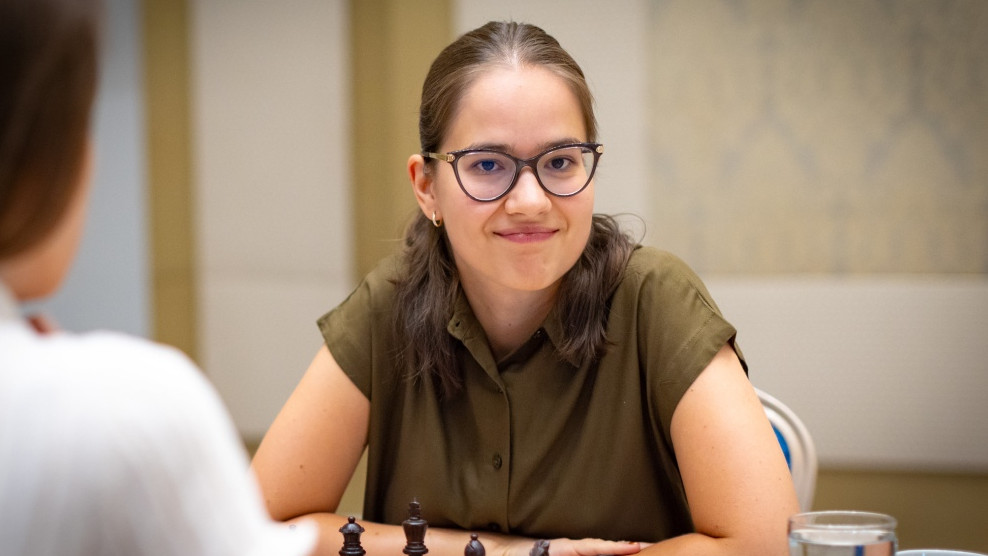
After 10 days and nine rounds of play, Alina Kashlinskaya – playing for Poland – secured first place with a victory against Ukraine’s Mariya Muzychuk in the final round, finishing with six points. Second place went to Kazakhstan’s Bibisara Assaubayeva, who ended with five points. Three players shared third place, with Greece’s Stavroula Tsolakidou emerging on top due to superior tiebreaks The first in a series of six tournaments in the new edition of the Women’s Grand Prix concluded in Tbilisi with high drama, as the winner was decided in the final game of the tournament. Apart from Assaubayeva, Kashlinskaya was the only other player entering the final round with five points. In the decisive match, Kashlinskaya faced Mariya Muzychuk, who was trailing by half a point. From the onset, it was clear that this would be a tough contest. Playing the Ruy Lopez, both sides were cautious in the early stages, resulting in an even position. Kashlinskaya offered Muzychuk a chance to head for a draw with the Zaitsev variation, but Muzychuk chose to fight on. This decision backfired, and by move 32, Muzychuk was significantly weaker; by move 39, she was completely lost. With this victory, Kashlinskaya also secured the leading position in the WGP series, with 130 points. Assaubayeva is in close second with 105. Kashlinskaya: ‘My 10-month-old helped me win’ “I am so happy to win this tournament. I played a decent game and won,” said Kashlinskaya in an interview immediately after the game. Kashlinskaya mentioned that she typically doesn’t follow other games during the round, even those crucial to her standing. “But somehow, in this game [between the other leader of the round – Bibisara Assaubayeva and Vaishali Rameshbabu], I decided to check it out. I saw that Vaishali was in time trouble and that the position was in Bibisara’s style, so in my head, I understood she would win this game, so I was surprised when it was a draw.” Kashlinskaya was the only player in the tournament accompanied by her child – 10-month-old Anthony, who was often seen with Alina and her mother at the hotel restaurant. When asked whether the presence of her toddler was more of a help or a hindrance to her game, Kashlinskaya quickly responded: “Well, you see the results. He helped a lot.” “I will definitely bring him with me to the next tournament,” she added, noting that her son even has chess pieces hanging from his pram, suggesting that his future may be connected to chess. When asked if she would encourage other chess moms to bring their children to events, Kashlinskaya said: “Of course. Again, my result speaks for itself. And for motherhood, it is important to be with the baby as much as possible.” FIDE has launched the project ChessMom to encourage players with small children to take them to the forthcoming Olympiad in Budapest. Assaubayeva second, Tsolakidou third Bibisara Assaubayeva played as Black against Vaishali Rameshbabu. Given Vaishali’s shaky performance in the event, this match presented a significant opportunity for the Kazakhstani player. Despite quickly equalizing in the Sicilian, Bibisara neither pressed the position nor created any substantial chances, leading to a draw after 22 moves. Assaubayeva explained after the game that her thoughts were still on her round-eight match, where she failed to convert a completely winning position against Tsolakidou. With 5.5 out of nine points, Assaubayeva awaited the outcome of the game between Mariya Muzychuk and Alina Kashlinskaya to determine whether she had secured first place. Vaishali, meanwhile, acknowledged that this was not her best tournament, noting that she needs to improve her time management, among other areas. Stavroula Tsolakidou, playing as White, drew with Alexandra Kosteniuk in the English Opening. Despite having an almost winning position a couple of times, Tsolakidou managed only a draw. Still, with 5.5 points and no defeats in her first appearance at the Women’s Grand Prix, this was a significant success for the Greek player. Kosteniuk finished on four points. In the final round, Nana Dzagnidze played as Black against Sara Khadem. Dzagnidze, one of the tournament favorites, often squandered advantages and lost games where she had the upper hand. Meanwhile, Khadem, having not competed in tournaments for the past six months, struggled with her matchups in Tbilisi. In their Nimzo-Indian game, Dzagnidze gained a winning position early on but let her advantage slip. Fortunately for her, Khadem made a blunder that led directly to a lost rook endgame. Dzagnidze finished in a solid fourth place, with 5/9, which she described as “a fair result,” though she noted, “looking at my games, it could have been seven out of nine.” Khadem ended the tournament in last place with 2.5 points. Anna Muzychuk drew as Black with Lela Javakhishvili. In the Indian Game, neither side created any chances nor offered any significant opportunities, resulting in a calm draw after 40 moves. Javakhishvili finished the tournament with five points, while Lela ended on 3.5 out of nine. FIDE WGP Standigns Here follows a closer look at the games from round nine: Stavroula Tsolakidou – Alexandra Kosteniuk This was a crucial game for Tsolakidou, as she was just half a point behind the two leaders. Stavroula played the English Opening, and the game started well for her – her pieces were more active, and she had the initiative on the board. In the middlegame, Stavroula had a better position but misplayed it. Here White could have obtain a decisive advantage with energetic 23.e5! but opted for a sluggish 23.Qe3. Still, the Greek got two more chances to seal the deal but missed the opportunities. The second miss was particularly bitter. After Kosteniuk’s 41…Qb5?? White could have won with 42.Qxh5 Qxb3 43.Qg4+ Kf8 44.Qc8+ Kg7 45.Qd7+ Kh6. Instead, Stavroula played 42.Qe6??, allowing Black to pick up a pawn and exposing her king to perpetual checks. Vaishali Rameshbabu – Bibisara Assaubayeva Vaishali Rameshbabu faced the top favorite of the round, Bibisara Assaubayeva, who was tied for first place with five
Kashlinskaya and Assaubayeva neck and neck in a round of missed opportunities
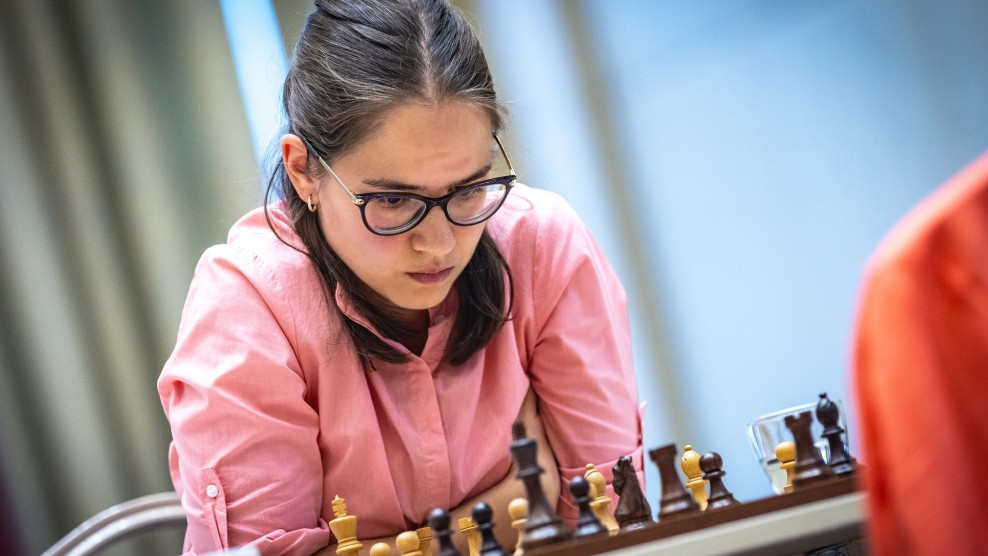
With just one round remaining at the Women’s Grand Prix in Tbilisi, two players are now tied for first place: Alina Kashlinskaya, who won, and Bibisara Assaubayeva, who drew her game. The day was marked by missed opportunities across the boards, indicating fatigue among the players The day witnessed dramatic swings in all games, as players struggled with the pressure and fatigue after eight intense rounds. Notably, this was only the second round in the entire tournament where more games ended with decisive results instead of draws. Alina Kashlinskaya emerged as the biggest winner of the round, tying for first place following her victory against Georgia’s Lela Javakhishvili in the Nimzo-Indian. It was the longest game of the round, finishing in just over five hours. Despite faltering in the middlegame and losing her advantage, Kashlinskaya managed to break through and win. With this victory, Kashlinskaya now has five points, while Javakhishvili remains on three. Bibisara Assaubayeva, who led the tournament after round seven, squandered a completely winning position against Stavroula Tsolakidou, missing an opportunity to extend her lead over the field. In the English Opening, things started well for Bibisara, but she misplayed and allowed Black to seize the initiative. Then, after Tsolakidou’s mistake, the tables turned completely, putting Bibisara in a winning position. However, with one misstep, Assaubayeva threw away the victory and had to fight for a draw. A big miss for Bibisara (now on five points) and a fortunate break for Tsolakidou, who is now on 4.5 points. Anna Muzychuk defeated Sara Khadem in the Giuoco Piano. This was the first game of the round to finish. Khadem held a solid position until the middlegame, when she pursued a faulty plan and underestimated back-rank threats, ending up losing. With this victory, Anna Muzychuk moved to 4.5 points, while Khadem remains on 2.5. In the Scotch Game, Alexandra Kosteniuk and Mariya Muzychuk exchanged mistakes throughout. Despite having several completely winning positions, Mariya Muzychuk let them slip, resulting in a draw. In the post-game interview, Mariya Muzychuk (now on 4.5 points) mentioned that she felt she had the upper hand but that fatigue was taking its toll. Alexandra Kosteniuk (on three points) left the venue quickly after the game, visibly exhausted. Nana Dzagnidze lost to Vaishali Rameshbabu in a sharp encounter. Despite achieving a strong initiative in the King’s Indian, Dzagnidze overextended and ended up losing. This defeat dashed Dzagnidze’s hopes of reaching the top spots, as she remains on four points. With 3.5 points, Vaishali has climbed up from the bottom of the leaderboard. Standings after Round 8 Saturday, August 24, marks the final round and the last chance for players to improve their standings. With two players tied for first place and three players just half a point behind, the final day promises excitement and surprises. The games will begin at 1 PM local time in Tbilisi, with the closing ceremony and the announcement of the winner scheduled for 8 PM. Here follows a closer look at the games of round eight: Alexandra Kosteniuk – Mariya Muzychuk In the Scotch Game, Kosteniuk was facing challenges early in the opening after playing a rare line starting 9. Nd2. The opponents traded inaccuracies transitioning from the opening to the middlegame but it was Black, who eventually emerged clearly better. However, Mariya did not find the best continuation at the first critical moment of the game. 27…Nb3? Black’s main idea is to play c6-c5 and 27…Ne4 served this purpose. The point is that 28.f3 fails to 28…Nxg3 29. Kxg3 c5! Black regains the piece and gets an overwhelming position as White’s king is very weak. After 28.Nxb3 Rxb3 29.Bd4 White was holding, but not for long. After exchanging a couple of mistakes the two transitioned to an even rook endgame, with Black having an extra pawn. Kosteniuk made another mistake after which she was lost. Black has just played 42…c6? (instead of 42…Ke6, winning) and threw a lifeline to White. Alexandra, however, opted for 43.g5?? 43.f5 or 43.Rb4 were holding moves. Now, with this move, Kosteniuk allowed Black a chance to reactivate the king and central pawns and get the upper hand again. But it was not the end of the story as Mariya was the last to err in this topsy-turvy game. 47…Kg7?? Instead of playing actively and supporting the progress of her central pawns with 47…Ke5, Black put her king on the defense. After 48.Kxg5, Kosteniuk created a passer on the h-file, and the position became even. The struggle continued, but neither side made any significant errors afterward, and a draw was agreed upon at move 64. Alina Kashlinskaya – Lela Javakhishvili Alina Kashlinskaya obtained a notably better position against Lela Javakhishvili in the Nimzo-Indian. White made a push in the center, but Black did not respond correctly, giving the opponent an advantage. White has control over the center, a pair of bishops and better chances to organize an attack. Alina did not hesitate to break through in the center. 17.d5! exd5 18.e5! Ne4 19.Bd2 Nxg4 20.hxg3 d4 White is now significantly better and Black needs to find ways to block off the bishops. But Kashlinskaya was slow in her attack and soon lost her advantage. Despite Black not choosing the best moves, White missed her chances. After the exchange of heavy pieces, including queens, the position was about even, but White still had the initiative. 29.e6 fxe6?? A blunder, after which Black loses an exchange. She should have captured with the knight with a defendable position. 30.Bxd4! cxd4 31.Bxe6+ Rxe6 32.Rxe6 d3 33.Rd6 Be4 34.Rd7. Save for a slight inaccuracy on move 40, Alina gradually improved her position and converted an extra exchange into a full point. Anna Muzychuk – Sarasadat Khademalsharieh In the Giuoco Piano the position was mostly equal until well into the middlegame when Sara Khadem made an error. The position is about equal. Both sides have completed their development and have active pieces. Black has more control over the center but
Dates for 2025 FIDE WWC in Batumi, Georgia announced

During the celebration of FIDE’s centenary in Tbilisi, FIDE announced the official dates and location for the highly anticipated 2025 Women’s World Cup. This prestigious event will take place in the picturesque seaside city of Batumi, Georgia, from July 5 to 29, 2025. Georgia holds a special place in the history of women’s chess, having produced some of the most legendary female players in the world. Batumi, known for its beautiful Black Sea coastline, is a fitting venue for this major tournament, which will gather the world’s top female chess players in a battle for glory. Chess in Georgia Georgia’s legacy in women’s chess is unparalleled. The country is home to iconic figures like Nona Gaprindashvili, the first woman to be awarded the title of Grandmaster by FIDE in 1978. Gaprindashvili was a five-time Women’s World Chess Champion, holding the title from 1962 to 1978, and her achievements laid the foundation for Georgia’s continued excellence in the sport. Another legend, Maia Chiburdanidze, succeeded Gaprindashvili as Women’s World Champion at 17, becoming the youngest player ever to win the title at that time. Chiburdanidze held the championship for 13 years, further solidifying Georgia’s reputation as a dominant force in women’s chess. These legendary players have inspired generations and maintained the country’s strong tradition in chess. It is no coincidence that Georgians are the reigning Women’s World Team Champions. The 2025 Women’s World Cup is a celebration of this rich heritage. Hosting the event in Georgia is a nod to the country’s contribution to women’s chess and a reminder of the enduring legacy of its champions. It is a fitting tribute to a nation that has shaped the course of women’s chess history and continues to be an inspiration for future generations. World Cup 2025 Selection The Women’s World Cup selection process remains consistent with the 2023 format, ensuring that the strongest and most deserving players will compete. 103 players will be selected according to specific criteria. Prize Fund The prize fund will also match that of the previous edition; a total prize fund of US$676,250, with the first prize of US$50,000, maintaining the tournament’s status as one of the most lucrative in women’s chess. Furthermore, the top three finishers in the Women’s World Cup will earn their spots in the 2025-26 Women’s Candidates Tournament, setting the stage for the next World Championship cycle. Previous Edition The 2023 edition of the Women’s World Cup was a highly competitive and thrilling event held in Baku, Azerbaijan, from July 30 to August 20, 2023. The tournament featured a knockout format, with intense matches that showcased the highest level of skill and determination. Aleksandra Goryachkina emerged victorious, adding this prestigious title to her already impressive record. Notably, Nurgyul Salimova reached the finals, which propelled her to the elite and reserved her spot in the Candidates. Photo: Stev Bonhage While the regulations for the tournament are still being finalized, with the potential for format changes, the 2025 FIDE Women’s World Cup promises to be another exciting and competitive event. FIDE is committed to delivering an unforgettable competition that will not only honor the rich legacy of women’s chess in Georgia but also contribute to the growth of women’s chess worldwide.
WGP Tbilisi: Assaubayeva emerges as sole leader
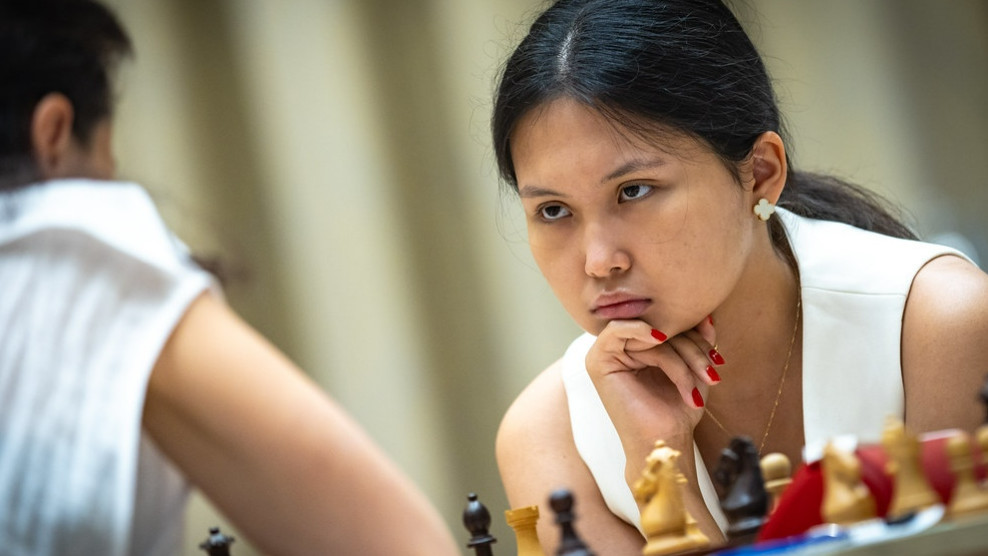
After seven rounds at the inaugural 2024/2025 Women’s Grand Prix tournament, a sole leader has finally emerged. Bibisara Assaubayeva leads the field with 4.5 points after defeating former Women’s World Champion Alexandra Kosteniuk in a complicated game. With just two more rounds to go, Assaubayeva holds a half-point lead over a group of four other players Almost all games in round seven promised tension and excitement, but all except one ended in a draw. Assaubayeva’s victory came in the Catalan, where Kosteniuk found herself on the back foot, allowing White to seize the initiative. Both players made mistakes in a very complicated game, but Kosteniuk’s errors in critical moments proved costly. She ended up in a lost knight endgame, which Assaubayeva efficiently converted to secure her win. ith this victory, Assaubayeva reached 4.5 points, claiming sole first place for the first time in the event, which shows how closely matched the players are. Kosteniuk remains on three points after seven rounds. One of the leaders from day one, Stavroula Tsolakidou, split the point with Nana Dzagnidze. The Georgian opted for the Caro-Kann, but Tsolakidou emerged with a better position early in the opening, only to lose the advantage in the later stages of the game. This was Tsolakidou’s sixth consecutive draw in the tournament. Both players now have four points. Sara Khadem drew with Alina Kashlinskaya in a Benko Gambit. Both players surprised each other in the opening, but as the game progressed, Khadem found herself on the defensive. Despite Black being a pawn up, the game transitioned into a rook endgame that Khadem confidently drew. Kashlinskaya, who won her first game in round six against Vaishali, now has four points. Khadem, showing improvement in the second half of the tournament with 2.5 points from her last three games, remains at the bottom of the scoreboard alongside Vaishali. Vaishali Rameshbabu and Anna Muzychuk played a balanced game in the Italian Opening, with neither side gaining a significant advantage. Muzychuk now has 3.5 points, while Vaishali stands at 2.5 points. Lela Javakhishvili drew with Mariya Muzychuk in the English Opening. Despite twice gaining a notably better position, Javakhishvili misplayed, allowing Muzychuk to equalize. After 55 moves, the game ended in a draw. Mariya Muzychuk now has four points, while Javakhishvili trails with three. Standings after Round 7 Here follows a closer look at the games of round seven: Bibisara Assaubayeva – Alexandra Kosteniuk Assaubayeva opted for the Catalan, but Kosteniuk knew her drill and nearly equalized. Assaubayeva made a tactical attempt that did not fully work, but Kosteniuk’s imprecise responses kept White’s chances alive. Despite missing several opportunities to secure her advantage, Assaubayeva eventually broke through in an endgame after Alexandra’s serious mistake. 37…Nb4? It was essential for Black to counter on the kingside with either 37…f5! or 37…Ne1+ But now: 38.h5+! Kf6 39.Nc5 Rxa2 40.Ne4+! Ke5 41.Rxa2 Nxa2 42.Ke3 Nb4 43.f4+! Kd5 44.Nf6+!! A wonderful move by Assaubayeva. White gets to the g7-pawn, and it is all over for Black. 44…Kd6 45.Ne8+ Ke7 46.Nxg7, and it was now a question of technique which Bibisara executed precisely. Stavroula Tsolakidou – Nana Dzagnidze In the Caro-Kann, Tsolakidou got an early advantage winning exchange and gaining a better position. Nana defended resourcefully and eventually got her chance. After either 22. Qf4 or 22. Qxf8 White could have continued to pressure Black. Stavroula, however, played 22. Qh4 but after 22…d4! 23. Nf3 d3! Dzagnidze got sufficient counterplay. The game eventually reached a balanced position, where Tsolakidou correctly placed her rook on the back rank, preventing further progress by Black. The game ended in a draw after 51 moves. Vaishali Rameshbabu – Anna Muzychuk In the Italian Game, neither player gained a significant edge throughout the game. Following several exchanges in the center, the players entered a drawn queen endgame and agreed to a draw on move 40. Sarasadat Khademalsharieh – Alina Kashlinskaya Kashlinskaya played the Benko Gambit, but after Khadem chose the trendy 5.e3 (the first choice of chess engines), she spent significant time in the opening. Eventually, Alina gained the upper hand after several Khadem’s inaccuracies. However, Sarasadat held firm, transitioning into a rook endgame where she successfully defended against Kashlinskaya’s extra pawn to secure a draw. Lela Javakhishvili – Mariya Muzychuk In the English Opening, both players had opportunities to take the lead, but neither capitalized on their chances. Javakhishvili could have got serious winning chances with a subtle 20. Rb1! (suggested by chess engines) followed by 21. Qxc5, although it is tough to see why the immediate capture on c5 (both with the pawn and the queen) is inferior to the intermezzo. After Lela played natural 20. dxc5, she was slightly better due to her control of the center, but failed to maintain the advantage. Muzychuk later also missed her chance later on. Instead of playing 25.Qb4, White went for 25.Red1, allowing Black to run through her position with the e-file pawn. But Muzychuk returned the favor to Lela by misplaying: 25…Rc7, and the position was even. The game transitioned into an even rook endgame. Both players tested each other but ultimately agreed to split the point. Round eight starts on Friday, August 23, at 3 PM local time in Tbilisi, Georgia. Round 8 pairings Alexandra Kosteniuk – Mariya MuzychukAlina Kashlinskaya – Lela JavakhishviliAnna Muzychuk – Sarasadat KhademalshariehNana Dzagnidze – Vaishali RameshbabuBibisara Assaubayeva – Stavroula Tsolakidou For more information about the event, including news, images, regulations, pairings, and games, please visit: womengrandprix.fide.com/ Written by Milan Dinic Photos: Anna Shtourman
The official song of 45th Chess Olympiad is out!

The Chess Olympiad, the largest global chess event, will be hosted by Budapest between 10 and 23 September. Zeneszöveg.hu and Artisjus organised an international songwriting camp where participants wrote songs to honor this prestigious event. One of these songs, written by Rose May and Raul, has been selected as the official song of the Chess Olympiad. Chess is coming home to Hungary in September—this sport has been highly popular here since its beginnings. It’s not only pro players that are involved in the most noble game of intellect—many Hungarian historical figures loved this game, including Ferenc Deák, Lajos Kossuth and Frigyes Karinthy. Some composers were also avid chess players—Ferenc Erkel composer, for example, was really passionate about chess and played whenever he could. This year Zeneszöveg.hu cooperated with Artisjus to organize a camp where music and chess met. Composers, lyricists and producers from nine countries came to spend three days in the camp to work with their Hungarian colleagues and create songs inspired by the 45th Chess Olympiad. From these songs, Trojan War by Rose May and Raul has been selected as the official song of the 45th Chess Olympiad by the Hungarian Chess Federation and the National Event Management Agency, the Hungarian organizers of this grand event. ROSE MAY & RAUL – TROJAN WAR – Official song for Chess Olympiad 2024 (youtube.com) This is a modern song with elements of pop and drum and bass, and its dynamic character evokes the excitement of chess games. Rose May and Raul’s song also has a video clip. With a special visual character and riveting storytelling, the clip, just like the song, features motifs of chess and speaks about love and strategy. Rose May’s debut as a singer-songwriter was in the autumn of 2023, when, along with BÖBE, P.Y.F.U., Brenka and others, she was featured on Toldyuuso’s album, SESSION_01. Her first album came out in 2023. Raul rose to fame in 2011, when he created a number of songs and clips with Tamás Horváth, which have become immensely popular since. Legendary players and rising stars from all over the world are coming to the 45th Chess Olympiad. The venue is the BOK Sports and Conference Centre, and the competition will be accompanied by an expo. The expo will offer a number of chess-related activities, bringing the sport closer to people of all ages. You can follow the games live, with professional commentators helping those who are less knowledgeable about chess, and the Hungarian Chess Federation is organizing a number of activities. All events and activities of the expo are free.
WPG Tbilisi: Alina Kashlinskaya joins leaders as the sole winner in Round 6
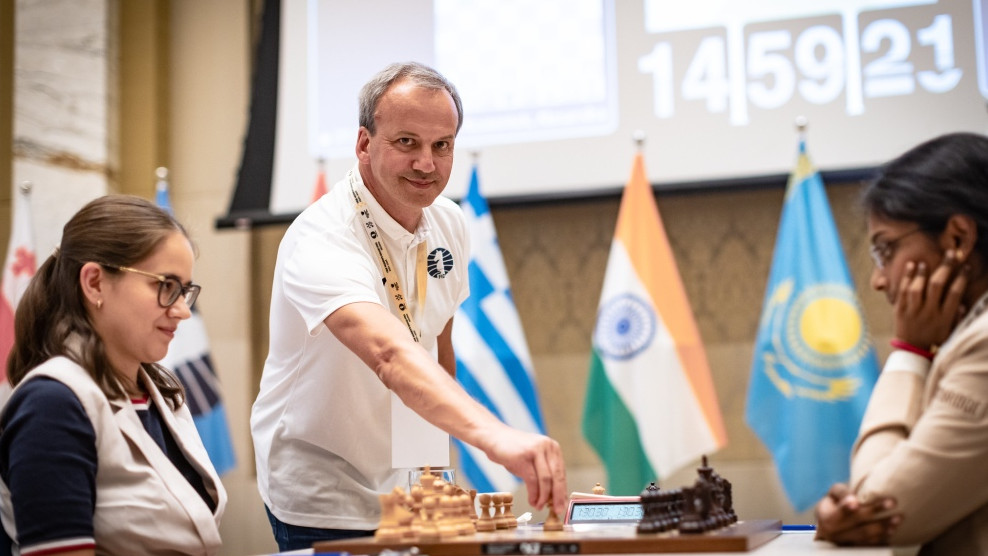
Alina Kashlinskaya claimed a hard-fought victory against India’s Vaishali Rameshbabu, moving into the leading pack with 3.5 points out of six. Nana Dzagnidze missed a chance to take the sole lead after giving away a winning position against Bibisara Assaubayeva The first leg of the 2024–2025 Women’s Grand Prix is now entering its final stages, with six out of nine rounds finished. Round six commenced with FIDE President Arkady Dvorkovich making the ceremonial first move in the game between Kashlinskaya and Vaishali. In the Dzagnidze–Assaubayeva game, FIDE Vice President Mahir Mammedov from Azerbaijan, a notable supporter of chess in Georgia, was honored with making the first move. Despite several promising positions, only one game ended decisively, while the other four resulted in draws. Alina Kashlinskaya triumphed in a fiercely contested game against Vaishali Rameshbabu. In the King’s Indian, Vaishali employed the sharp 9…b5 line, which Kashlinskaya was well-prepared for. White took control after move 15 and confidently converted her advantage. This victory puts Kashlinskaya at 3.5 points, among the tournament leaders, while Vaishali remains on two points. Bibisara Assaubayeva once again pulled off a miraculous save, this time against Nana Dzagnidze. In a King’s Indian where Dzagnidze was clearly better as early as by move 19, but she eventually faltered, allowing Assaubayeva to escape with a draw. Dzagnidze attributed her inconsistent play to her slow recovery after giving birth seven months ago, stating, “I will definitely need to sit down and revisit this.” Both players now sit at 3.5 points. Sara Khadem, playing the Morphy Defense against Mariya Muzychuk, reached a significantly better position, nearing victory. However, a critical misstep involving the exchange of queens nearly nullified her advantage. Although she continued to press in the endgame, Muzychuk skillfully countered all attempts, resulting in a draw. Mariya ends the round with 3.5 points, while Sara has two points. Alexandra Kosteniuk and Lela Javakhishvili were the first to finish in today’s round, splitting the point in a Ruy Lopez. Kosteniuk is now at three points, while Javakhishvili has 2.5 points. The longest game of the day was between Anna Muzychuk and Stavroula Tsolakidou. Despite nearly five hours of play, neither side managed to gain a decisive advantage, leading to a drawn bishop endgame. Both players are now at 3.5 points. Standings after Round 6 Here follows a closer look at the games of round six. Alexandra Kosteniuk – Lela Javakhishvili Lela Javakhishvili played the Berlin Defense against Alexandra Kosteniuk and reached a comfortable position. The game ended in an early draw after a threefold repetition. Mariya Muzychuk – Sarasadat Khademalsharieh Sara Khadem played the Morphy Defense in the Ruy Lopez. She began pressuring the center and nearly broke through in the middlegame. Despite being a pawn down, Black’s position looked promising. White’s 16.Re1? missed the opportunity to exchange queens, hoping for salvation in an inferior endgame. Sara should have taken on f3 with her bishop, followed by Rb8, but instead played 16…Qb8, allowing White to regain footing after 17.Nbd2. Black eventually regained the pawn and achieved a better position again, but inaccuracies in execution allowed Mariya to hold, and the game ended in a draw after 55 moves. Alina Kashlinskaya – Vaishali Rameshbabu This was the sharpest game of the round, with both players navigating tactical complexities from the outset. In the King’s India Vaishali surprised with the 9…b5 line, which, though unexpected, was familiar to Kashlinskaya from prior preparation. Here, Vaishali faced a difficult decision. The computer suggested 14…a6 followed by e3 at some point. Instead, she played 14…Ng4?, giving White a clear edge. Though Kashlinskaya’s response wasn’t perfect, she ultimately secured a significant advantage. By move 29, White was completely winning. Vaishali made a desperate pawn push down the kingside, but the powerful centralization of White’s queen ruined her hopes. Kashlinskaya maintained her composure and clinched the win, forcing Vaishali to resign four moves down the road, with a queen promotion inevitable. Anna Muzychuk – Stavroula Tsolakidou This game between was a prolonged struggle, with White’s achieving the 2:1 pawn majority on the queenside and a promising endgame. It looks like White missed her chance on move 37. After 37. Nb7+ followed by 38. Nc5 Stavroula would have been doomed for an uphill battle in a highly unpleasant endgame. However, after a somewhat sluggish 37. Be2, Black got off the hook. The game extended to 57 moves, ultimately ending in a draw. Nana Dzagnidze – Bibisara Assaubayeva In this matchup between two leaders of the round, Nana Dzagnidze, playing the system authored by Smyslov against King’s Indian, quickly gained the upper hand, outpacing Bibisara on the clock. The position was balanced, but White’s 15.b4 began pressing the center. Black’s ambitions 15…Rg8? and delayed reaction with 16.c5 Nh5? allowed White to seize the initiative. Nana eventually sacrificed an exchange, gaining a dominant position. However, in a turn of events reminiscent of her earlier games, Nana started to err, allowing Bibisara to turn the tables. White is clearly dominating despite being an exchange down. Here 31. Rc6 or 31. Rd1 would have kept Black on the ropes as she had no real play. Instead, Nana opted for 31. Qd1? and dropped her advantage with a couple of substandard moves. Later on, she was forced to exchange her queen for two rooks, but Black’s passer on the c-file and Nana’s imprecise play led to a draw. Round seven starts on Thursday, August 22, 3 PM local time in Tbilisi, Georgia. Round 7 pairings: Bibisara Assaubayeva – Alexandra KosteniukStavroula Tsolakidou – Nana DzagnidzeVaishali Rameshbabu – Anna MuzychukSarasadat Khademalsharieh – Alina KashlinskayaLela Javakhishvili – Mariya Muzychuk For more information about the event, including news, images, regulations, pairings, and games, please visit womengrandprix.fide.com/ Written by Milan Dinic Photos: Anna Shtourman
FIDE endorses Leap KK 9909 clock
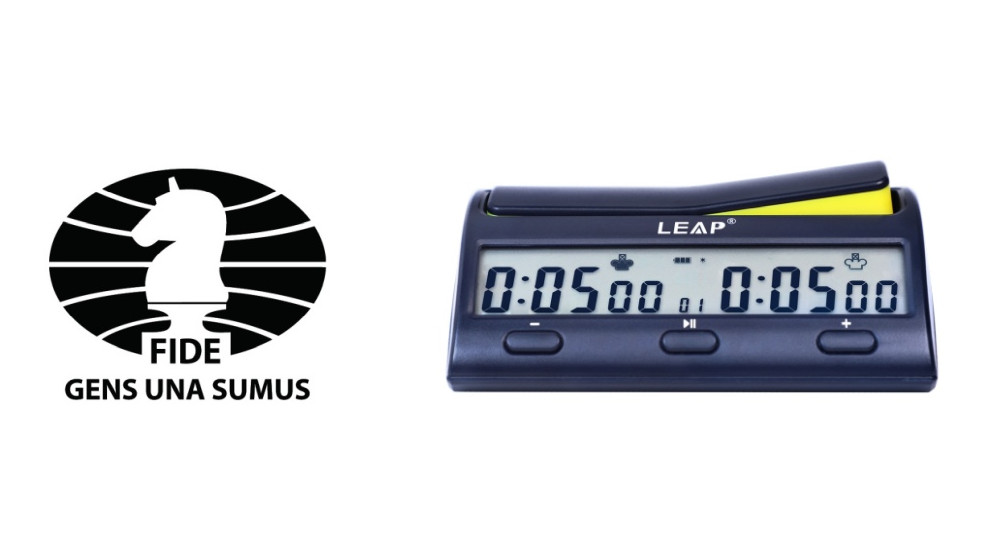
FIDE is pleased to announce the official endorsement of the Leap KK 9909 Clock, now available at LEAP. This endorsement, under decision CM2-2024/17, represents another step towards assisting vendors in producing affordable chess equipment. The Leap KK 9909 Clock underwent rigorous testing and evaluation by IA Arasu Balasubramaniyan and IA Hendrik du Toit from the Technical Commission’s Critical Tec Department, headed by IA Mario Held. The clock meets all the criteria for FIDE Compliant Electronic Chess Equipment, details of which can be found in the FIDE Handbook. The FIDE Technical Commission remains committed to fostering innovation in the chess community by employing advanced technology. For any inquiries or further information, please contact Hendrik du Toit at secretary.tec@fide.com.
FIDE celebrates centenary in Tbilisi with chess legends
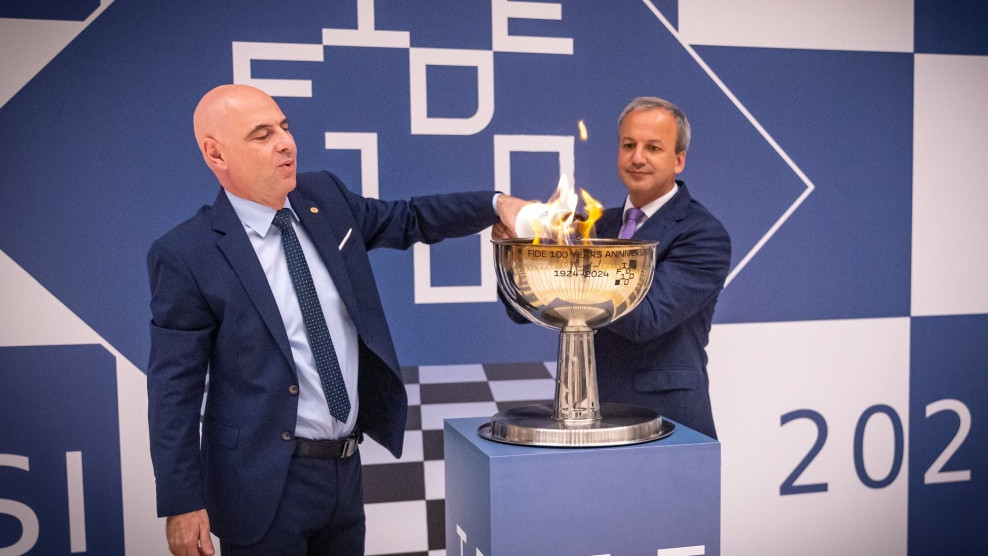
The FIDE 100 Torch Relay, commemorating the centenary of the International Chess Federation (FIDE), arrived in the Georgian capital today, marking a significant milestone in the year-long global celebrations The torch, which began its journey in India in February, was ceremoniously lit this afternoon at the Congress Hall of the Biltmore Hotel by FIDE President Arkady Dvorkovich and President of the Georgian Chess Federation Akaki Iashvili, along with other distinguished guests. “It is my pleasure and honor to be here for the first stage of the Women’s Grand Prix. I am delighted to celebrate FIDE’s 100th anniversary. The torch has traveled to many countries, including Canada just a few days ago, and now it has arrived in Tbilisi. I would like to thank the Georgian authorities and the Georgian Chess Federation for welcoming us. Georgia has consistently hosted top-level events, and we are grateful for that. I am sure we will return here again,” said FIDE President Arkady Dvorkovich. Akaki Iashvili informed the audience about an ongoing project to provide Georgian chess players with the best instructive chess books, translated into Georgian. During the ceremony, these books were handed out to Georgian players by FIDE President Arkady Dvorkovich. The event was graced by the presence of Georgian and international chess dignitaries, including participants of the Women’s Grand Prix tournament, all of whom wore white shirts with the FIDE100 insignia and the Georgian flag on the sleeve. One of Georgia’s most revered chess figures, Nona Gaprindashvili, delighted the audience by playing a friendly chess match with FIDE President Arkady Dvorkovich. In a twist, midway through the game, they stepped away from the board, inviting another pair of players—Anna Muzychuk and Alina Kashlinskaya—to continue the match. The game was then passed along to other participants in the Women’s Grand Prix. In celebration of the occasion, a giant 120cm tall commemorative cake shaped like a chess queen was presented at the end of the ceremony. Women’s World Cup dates announced During the FIDE 100 ceremony in Tbilisi, FIDE officially announced the dates and location for the upcoming Women’s World Cup. The tournament is set to take place in the picturesque seaside city of Batumi, Georgia, from July 5 to 29, 2025. This announcement marks a significant milestone in the chess calendar, as the Women’s World Cup will bring together the world’s top female players to compete in one of the most anticipated events of the year. An important place for Georgian and chess history The venue for the FIDE 100 ceremony, the Congress Hall of the Biltmore Hotel, holds deep historical significance. This Tbilisi landmark, which once housed sessions of the Georgian Parliament, is symbolic in the country’s history. It was here that the 1991 Act of Restoration of State Independence and the 1995 Constitution of Georgia were signed. The hall also has a special place in chess history, having hosted the finals of the 2017 FIDE World Cup between Levon Aronian and Ding Liren. The Tbilisi celebration is one of many global events marking FIDE’s 100th anniversary, reflecting the enduring legacy of chess and its continued relevance on the world stage.
Infinite Chess online panel discussion for chess teachers and tutors announced
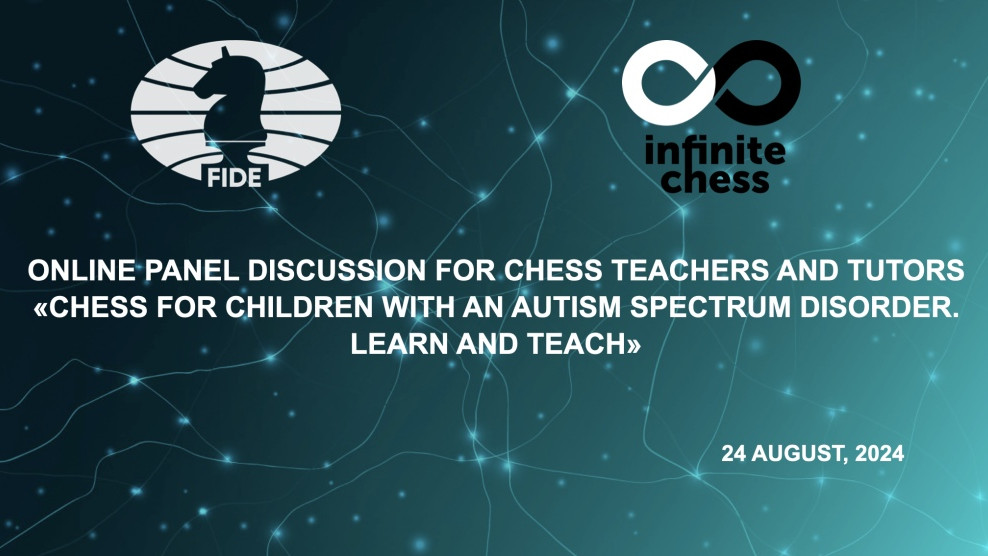
Online panel discussion for chess teachers and tutors, “Chess for children with an autism spectrum disorder. Learn and teach”, will take place on August 24, 2024, between 13:00 and 15:00 CEST. The main goal of the discussion is to share the partners’ experiences and ask the most challenging questions while implementing the project. The conference will be held online via Zoom. Zoom link: https://us06web.zoom.us/j/86838350771?pwd=dp6ZLMwpCLNr1aq0NHLad8KpbSEBM0.1 Meeting ID: 868 3835 0771 Passcode: 11862 Schedule of the event 13:00 – welcome speech by Dana Reizniece-Ozola, Project supervisor, Deputy Chair of FIDE Management Board 13:05 – welcome speech by the Anastasia Sorokina, Leader of the project, FIDE WOM Chair 13:10 – Educational program benefits: field insights (Sharon Whatley, Gibraltar) 13:20 – Questions & Feedback 13:30 – Frequent challenges: behavior, emotions regulations, discipline (Evguenia Charomova, New Zealand) 13:40 – Questions & Feedback 13:50 – Parental support & social acknowledgement, stigmatization (Melodi Dincel, Turkey) 14:00 – Questions & Feedback 14:10 – Social project funding: search, tricks and increase (Pep Suarez, Menorca, Spain) 14:20 – Questions & Feedback 14:30 – Roadmap update: 6 stage of the project: Sep-Dec, 2024 (Maria Tamkovich, project coordinator, FIDE) 14:40 – Questions & Feedback Panel discussion agenda About Infinite Chess Project FIDE INFINITE CHESS Project aims to increase knowledge and awareness of chess for children with autism spectrum disorder (ASD), give practical advice to teachers and parents, study the benefits of introducing to chess and develop various teaching methods. Supported by FIDE and IOC the pilot project went global in 2021 and thrives in 19 countries for more than 150 children with ASD. Each year Infinite Chess team organizes Educational Seminars “Chess for children with ASD. Learn and teach”. The main goal of this seminar is to provide core knowledge and practical advice for teachers, trainers, and parents who wish to teach chess to kids with autism. The first educational program “Methodological guide for teachers” is available in English, French, Spanish, Russian, Arabic. Official website: infinitechess.fide.com/

